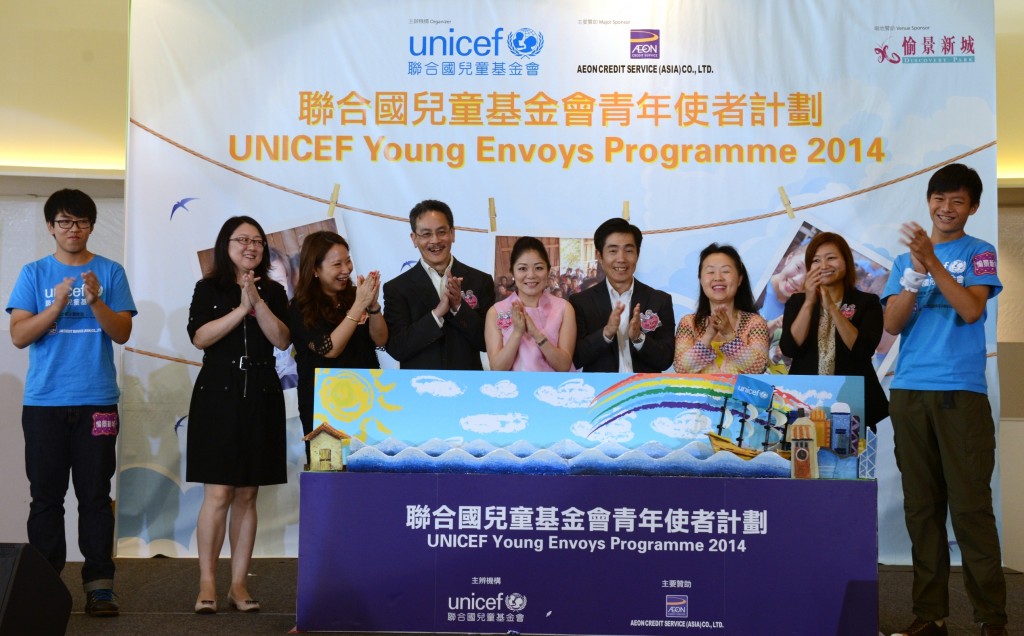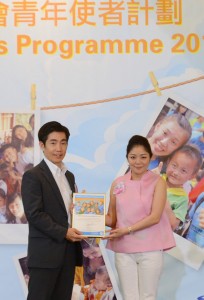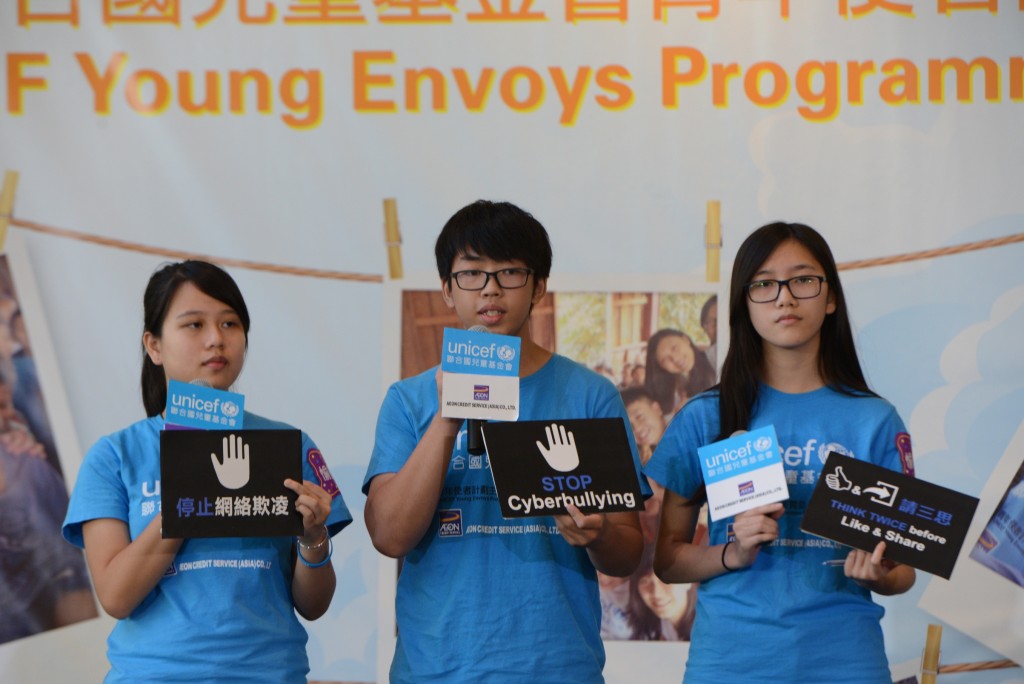Survey revealed ALL interviewed secondary school students had experienced cyberbullying, yet half turned a blind eye to it60 newly appointed UNICEF Young Envoys will take to the streets next month to urge the public to stop cyberbullying
2014-08-21
© UNICEF HK/2014

© UNICEF HK/2014
HONG KONG, 21 August 2014 — Sixty secondary school students, who are concerned about children’s rights, are appointed as UNICEF Young Envoys today after a 9-month training. They also announced their advocacy projects to promote children’s rights in the community next month. One of the projects will respond to the survey on cyberbullying conducted by the Young Envoys.
The survey showed that all interviewed secondary school students had been involved in or witnessed cyberbullying. 20 per cent of them admitted they were “bullies” or “victims” while 90 per cent had witnessed cyberbullying. What’s worrying is half of the “witnesses” turned a blind eye to cyberbullying, and almost 10 per cent of them even joined the bullying. To stop cyberbullying, UNICEF Young Envoys will take to the streets next month, urging people to help stop cyberbullying by thinking twice before they ‘Like’ or ‘Share’ posts on social media.
Sixty students from 46 secondary schools completed over 10 training workshops provided by the Hong Kong Committee for UNICEF (UNICEF HK) in the past nine months. They’ve learned child rights and the state of children worldwide. They organized school talks, day camps and set up booths to advocate children’s rights and raise funds among youths. To learn more about the situation of children in developing countries, they also visited the left-behind children in Gansu and children with malnutrition in Laos. In addition, they formed three groups to investigate local child issues, including cyberbullying, deprivation of the right to play and children with attention deficit or hyperactivity disorder being labeled.
Today, the students are appointed as UNICEF Young Envoys for their excellent performance. At the appointment ceremony, Ms Judy Chen, Chairman of UNICEF HK said, “The Young Envoys hope to draw public attention on children’s rights and to join their advocacy efforts by initiating advocacy projects. This year marks the 25th anniversary of Convention on the Rights of the Child, there would be many advocacy opportunities available for our Young Envoys to speak up for their peers and to champion children’s rights, carrying on the spirit of theme of today’s appointment ceremony - ‘We United as One’.” Ms Judy Chen added, “We have to rely on the youths to carry on the journey of advocating children’s rights and make it go further.”

© UNICEF HK/2014
The Young Envoys will kick off their first major project to advocate children’s rights next month. One of the projects will respond to their own survey on cyberbullying. The survey was conducted in June and July this year. 251 secondary one to six students were interviewed. The survey revealed the following results: All interviewees had been involved in or witnessed cyberbullying, in which 8.4 per cent had been “bullies”; 10 per cent of them had been “victims”; 88 per cent of them had witnessed cyberbullying (interviewees can choose more than one option, so the total percentage is over 100 per cent).

© UNICEF HK/2014
Thirty eight per cent of the “bullies” interviewed stated that the reasons of bullying were “fighting for justice” while 27 per cent were simply because of “life is boring/ dull” , or wanted to “make jokes on others”. 71 per cent of their bullying targets were schoolmates. In addition to bullying just for fun, the “bullies” also believed they could ing justice by holding a public trial online.
Besides, half of the “witnesses” ignored cyberbullying while 9 per cent even joined the bullying, only less than 15 per cent of them would try to stop it. These implied most of the secondary school students are used to cyberbullying. Furthermore, peer influence may be one of the factors for worsening cyberbullying.
Karta Luo Li-xin (15-year-old), one of the UNICEF Young Envoys who conducted the survey on cyberbullying, experienced the destructive power of cyberbullying. She once witnessed one of her schoolmates attempted to suicide after facing collective exclusion from schoolmates on social media. Karta said, “I had never thought of a post, a ‘Share’ or a ‘Like’ on Facebook could have such an enormous destructive power.” This incident made her realize that “witnesses” also have a responsibility to stop cyberbullying.
Therefore, she planned with her groupmates of UNICEF Young Envoys to take to the streets, raising public’s awareness on cyberbullying, and calling on people to think twice before they ‘Like’ or ‘Share’ a post on social media. She added, “It is very easy to press a button, but we should hold on and think twice before pressing. We hope all young people can stop being numb, and stand up and voice out to stop cyberbullying.”
UNICEF Young Envoys Programme is a distinctive youth leadership scheme established in 1996, aiming to arouse public concern for child rights and the state of children worldwide through empowering a promising group of young people and nurturing them as child rights advocates. The 10-month programme explores students’ potential, oadens their horizons and enhances personal development. In almost two decades, UNICEF HK has nurtured over 950 secondary students from more than 130 schools to become Young Envoys, and promote children’s rights to over 30,000 secondary students. Young Envoys have visited different places such as the Philippines, Nepal, Cambodia, Indonesia, Vietnam, Laos, and Gansu, Qinghai and Shanxi in China.
The UNICEF Young Envoys Programme 2014’s major sponsor: 
- END -
Event photos can be downloaded here









